ARKANSAS’ ARTS + NATURE FESTIVAL PRESENTED BY WALTON ARTS CENTER















Walton Arts Center is thrilled to kick off the 12th Anniversary Season of the Artosphere Festival Orchestra — the centerpiece of Artosphere: Arkansas’ Arts and Nature Festival — and to once again welcome back more than 90 premier musicians from around the world under the direction of Corrado Rovaris. In his twelfth season as Music Director, Rovaris returns to the podium leading the Artosphere musicians in performances of classics by Mozart, Copland and Dvořák, a new concerto by Nick DiBerardino, and the tour de force, Verdi’s Messa da Requiem, featuring four soloists and a chorus of 130 singers. Thank you for being a part of our Festival, and a special thanks to the tremendous generosity of our funders and partners.
We are so glad to see you – enjoy.
Peter B. Lane President/CEO, Walton Arts Center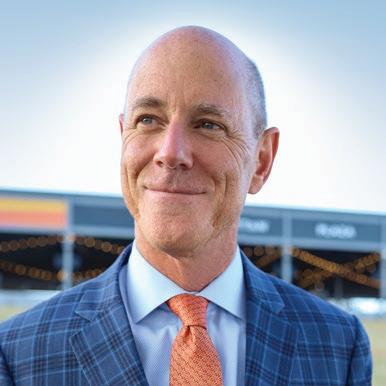
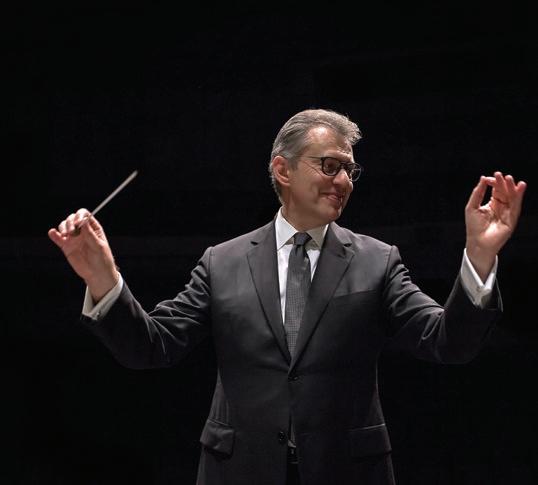
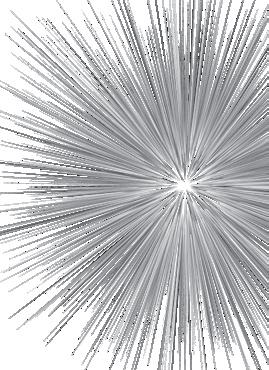


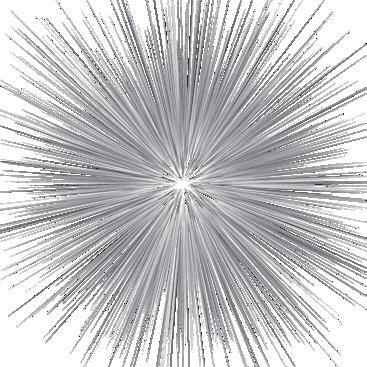

ARTOSPHERE SPONSOR
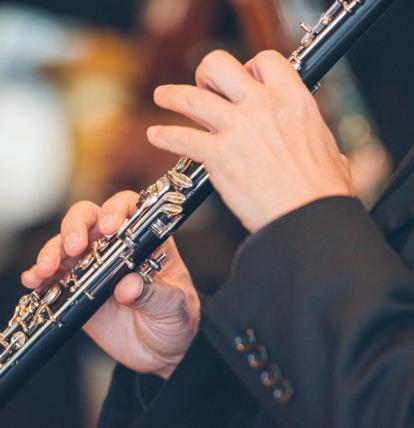
MEDIA PARTNERS
INDIVIDUAL SUPPORT
Premier festival support provided by Kelly & Marti Sudduth. Support for Maestro Corrado Rovaris and Dover Quartet provided by Reed & Mary Ann Greenwood. AFO underwriters are Greg & Hannah Lee and Peter B. Lane & Barbara Putman Artosphere Festival is made possible by Friends of Artosphere.
Artosphere features free and low-cost events for the community. Visit artospherefestival.org to make a gift in support of these events.
Now in its twelfth and final season, the Artosphere Festival Orchestra — comprised of more than 90 musicians from prestigious ensembles, orchestras and music programs around the world — has once again gathered in the Ozarks for a professional music-making experience unique to Artosphere. Spending two weeks under the baton of acclaimed Music Director Corrado Rovaris, these world-class musicians will perform three concerts, one in the Great Hall at Crystal Bridges Museum of American Art and two in Baum Walker Hall at Walton Arts Center.
Music Director
Corrado Rovaris, Music Director of Opera Philadelphia and the Artosphere Festival Orchestra, is celebrated for his vibrant style and warm presence at the podium.
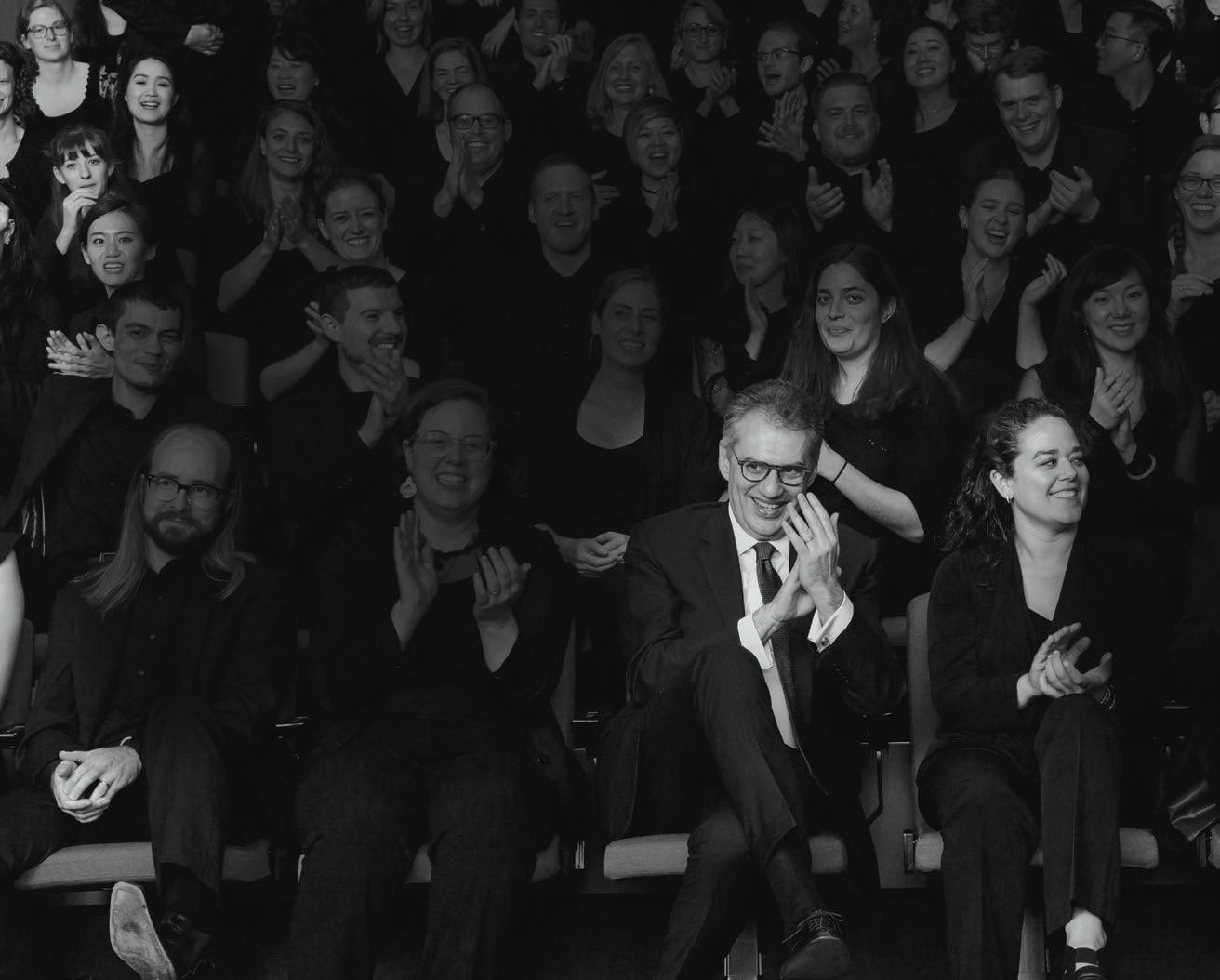
In the 2023-24 season Rovaris conducted Opera Philadelphia’s Simon Boccanegra and Madame Butterfly. This past year, he led a revival of Alfredo il Grande at the 2023 Donizetti Opera Festival in Bergamo and conducted Le nozze di Figaro at Deutsche Oper Berlin. After this year’s Artosphere Festival, Rovaris will conduct performances of La Traviata at Santa Fe Opera.
A proponent of new works, Rovaris helped launch Opera Philadelphia’s annual Festival O, featuring world premieres and other operatic events including the Aurora Series for Chamber Opera. Recent premieres include Glass Handel, Elizabeth Cree, and Written on Skin.
Born in Bergamo, Italy, Corrado Rovaris graduated from the
of the Teatro alla Scala. Soon after, he began appearing as a regular guest conductor at opera companies around the world including La Scala, Maggio Musicale Fiorentino, Teatro La Fenice, Teatro dell’Opera di Roma, Teatro Comunale di Bologna, Opéra de Lyon, Opera Monte Carlo, Théâtre Municipal de Lausanne, Oper Köln, Oper Frankfurt, the Japan Opera Foundation, Canadian Opera Company, Santa Fe Opera, St. Louis Opera, and Glimmerglass Opera. He has established a close connection with the Curtis Institute of Music and since 2009 has led many CurtisOpera Philadelphia productions.
Maestro Rovaris was awarded knighthood by the Order of Merit of the Italian Republic in 2015 and was honored in 2016 with the Franco Abbiati Prize.
Music Director & Conductor
Corrado Rovaris
Violin
Joel Link, Concertmaster
Bryan Lee, Principal
Second
Katherine Baloff
Samantha Bennett
Jake Buhler
Charlotte Crosmer
Andrea Daigle
Hoi Ting Davidson
Miika Gregg
Laura Christina Herrera
Er-Gene Kahng
Eunice Kim
Minju Kim
Ben Kronk
Audrey Lee
Natalie Lee
Luri Lee
Yuan-ju Liu
Liya Ma
Margeaux Maloney
Zoë Martin-Doike
Avi Nagin
Maureen Nelson
Junsoo Park
Sabrina Parry
Sarah Peters
Lauren Pulcipher
Meredith Riley
Miho Sakon
Natsuko Takashima
Nicholas Tavani
Delcho Tenev
Yordan Tenev
Benjamin Thatcher
Jonathan Toomer
Michael Turkell
Shuyi Wang
Viola
Julianne Lee, Principal
Hezekiah Leung, Principal +
Stephanie Block
Szuhua (Mia) Chen
Rachel Daniels
Arnaud Ghillebaert
Carlos Lozano
Yumi Oshima
Cara Pogossian
Edwardo Rios
Robert Alvarado Switala
Madeline Warner
Luther Warren
Zsche Chuang Rimbo Wong
Cello
Camden Shaw, Principal
Troy Chang
Hana Cohon
Noemie Golubovic
Keeon Guzman
Jiayin He
Julia Henderson
Ania Lewis
Esther Seitz
Brandon Xu
Susie Yang
Bass
Cory Palmer, Principal
Ryan Bassett
Maurice Warren Belle
Drew Collins
Paul Macres
Sean O'Hara
Brian Thacker
Russell Thompson
Sarah Wager
Harp
Allegra Lilly, Principal
Flute/Piccolo
Luke Fitzpatrick, Principal
Katherine Marx
Amanda Galick
Oboe/English Horn
Bobby Nunes, Principal
Eder Rivera
Casey Kearney
Clarinet/Bass Clarinet
Amer Hasan, Principal
Katelyn Poetker
Ben Chen
Carmen V. Izzo
Bassoon/Contrabassoon
Michael Matushek, Principal
Hunter Gordon
AJ Neubert
Diego Peña
Horn
Gabriel Kovach, Principal
Lauren Hunt
Rachel Velvikis
Joy Hodges
Josh Michal
Trumpet
David Dash, Principal
Mary Elizabeth Bowden, Principal +
Diana Wensley
Morgen Low
Alexander John Fioto
Jhoan Garcia
Tiago Linck
Alan Tolbert
Trombone/Bass Trombone
Chris Lindgren, Principal
Austin Richardson
Zachary Haas
Tuba
Jason Tanksley, Principal
Percussion
Kramer Milan, Principal
Garrett Arney, Principal*
David Cavazos
Connor Stevens
Timpani
Arlo Shultis, Principal
Piano/Celeste
Kristine Olefsky, Principal
Artosphere Festival Orchestra Chorus Director
Lyndon Meyer
General Manager
Jason Howell Smith
Personnel & Stage Manager
Nathan Lofton
Music Librarian
J Robert Loy
Administration/Housing/ Transportation
Cody Kopp
Eric Gramling
+ Mozart in the Museum
* Verdi’s Requiem
May 11 | 7pm
St. Paul’s Episcopal Church Fayetteville
Joel Link, Violin
Bryan Lee, Violin
Julianne Lee, Viola
Camden Shaw, Cello
Named one of the greatest string quartets of the last 100 years by BBC Music Magazine, the two-time GRAMMY-nominated Dover Quartet is one of the world’s most in-demand chamber ensembles. The Dover Quartet is the Penelope P. Watkins Ensemble in Residence at the Curtis Institute of Music and holds additional residencies at Northwestern University and the Artosphere Festival. The group’s awards include a stunning sweep of all prizes at the 2013 Banff International String Quartet Competition, grand and first prizes at the Fischoff Chamber Music Competition, and prizes at the Wigmore Hall International String Quartet Competition. Its honors include the prestigious Avery Fisher Career Grant, Chamber Music America’s Cleveland Quartet Award and Lincoln Center’s Hunt Family Award.
The Dover Quartet’s 2023-24 season includes a North American tour with
Leif Ove Andsnes, performances with Haochen Zhang and David Shifrin, and a tour to Europe and Israel. Recent collaborators include Emanuel Ax, Inon Barnaton, Ray Chen, the Escher String Quartet, Bridget Kibbey, Anthony McGill, Edgar Meyer, the Pavel Haas Quartet, Roomful of Teeth and Davóne Tines. The quartet recently premiered Steven Mackey’s theatrical-musical work Memoir and works by Mason Bates, Marc Neikrug and Chris Rogerson.
The Dover Quartet’s GRAMMYnominated recordings include its highly acclaimed three-volume recording, Beethoven Complete String Quartets (Cedille Records), which was hailed as “meticulously balanced, technically clean-as-awhistle and intonationally immaculate” (The Strad), and The Schumann Quartets (Azica Records).
The Dover Quartet was formed at Curtis in 2008; its name pays tribute to Dover Beach by fellow Curtis alumnus Samuel Barber. The Dover Quartet proudly endorses Thomastik-Infeld strings.
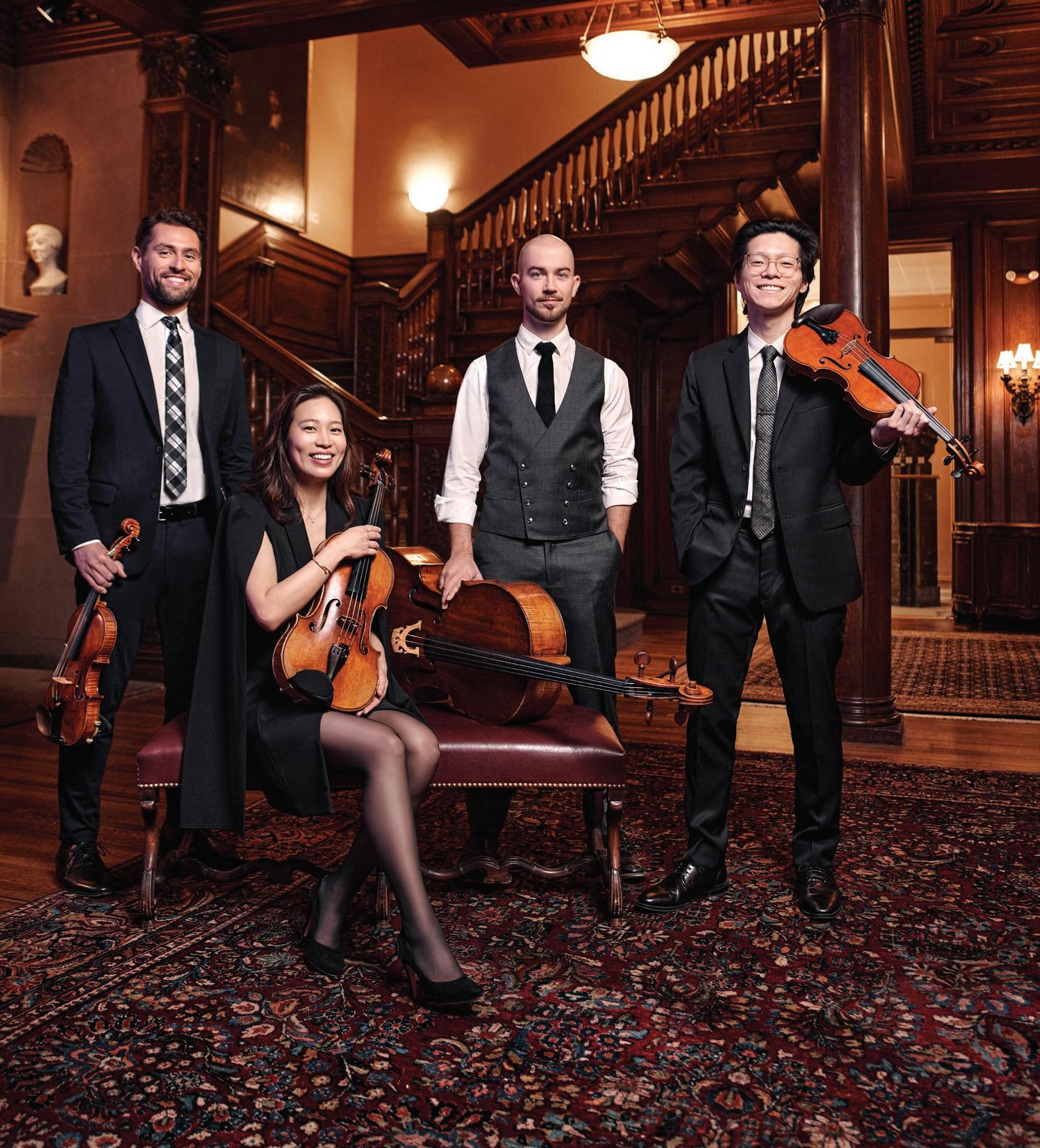
Wolfgang Amadeus Mozart
Quartet in E-flat major, K. 428
Dmitri Shostakovich
Quartet No. 9 in E-flat major, Op. 117
INTERMISSION
Pyotr Ilyich Tchaikovsky
Quartet No. 1 in D major, Op. 11
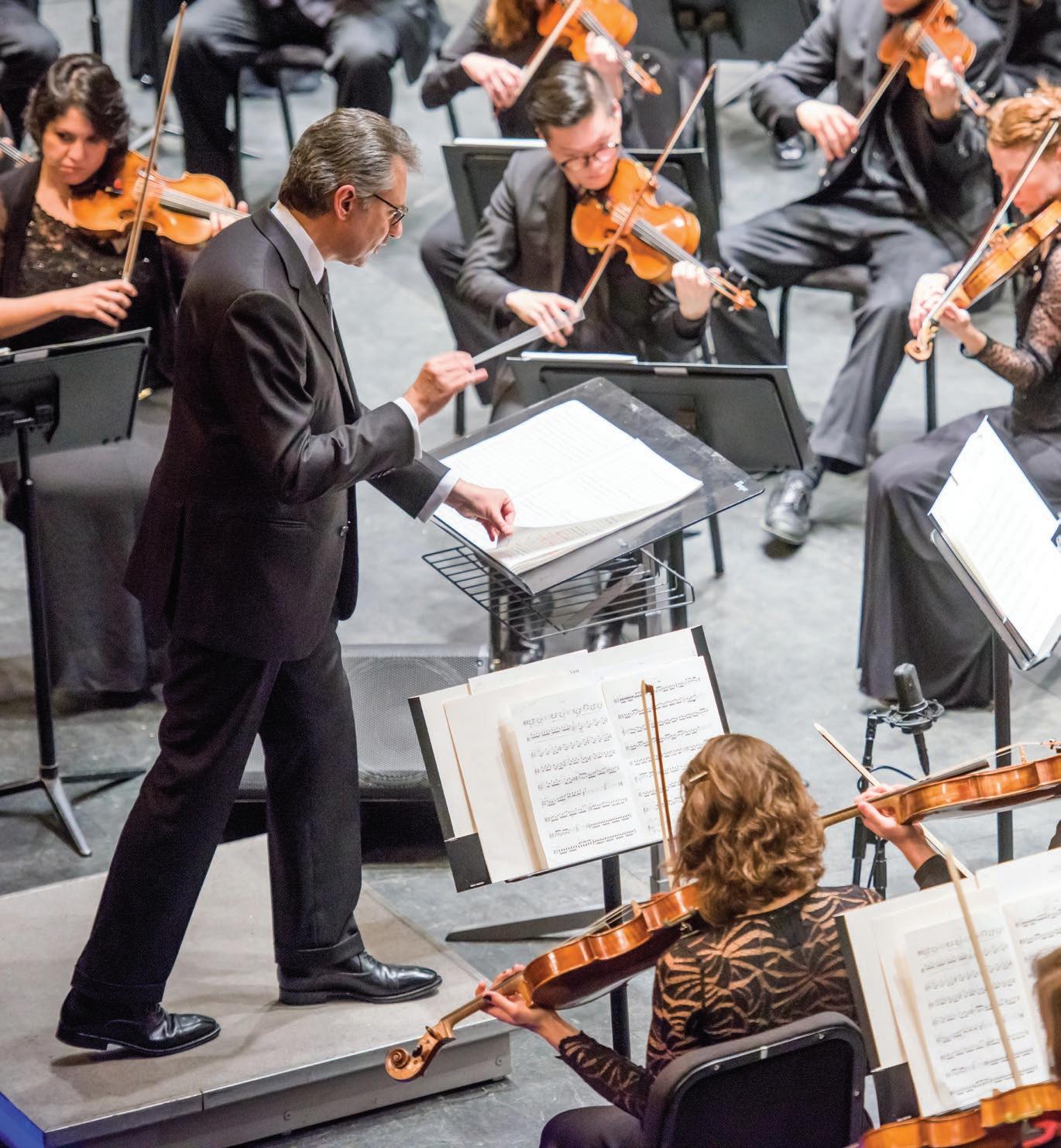
Artosphere Festival Orchestra
Corrado Rovaris, Music Director
A 10 x 10 Arts Series Concert
Sijia Huang, Percussion
Garrett Arney, Percussion
May 14 | 7pm
Walton Arts Center’s Baum Walker Hall
Special thanks to 10x10 Series sponsor Paul M. Angell Family Foundation. Media support for the 10x10 Series provided by KUAF Public Radio and the Northwest Arkansas Business Journal.

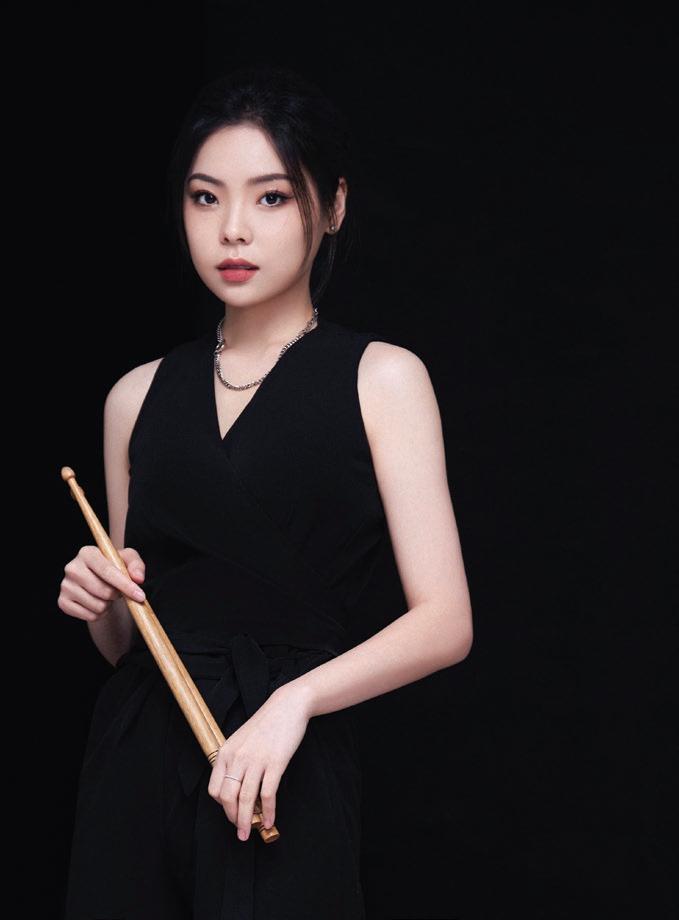
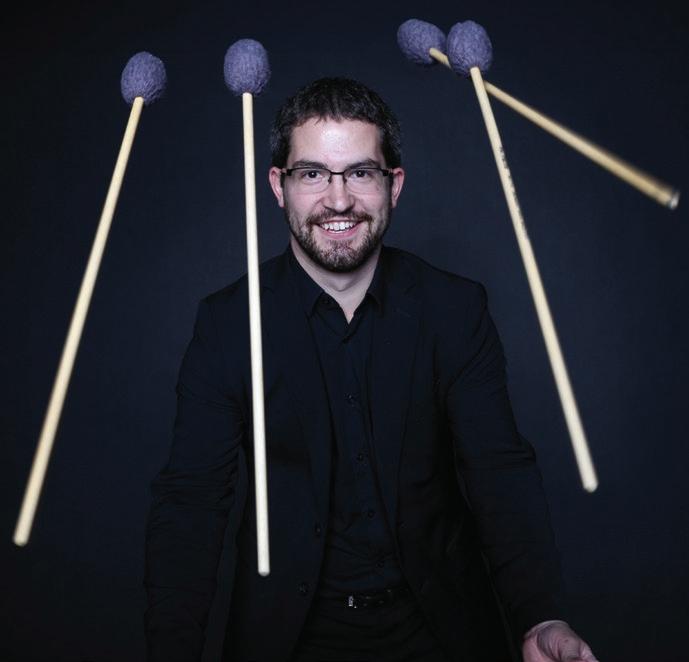
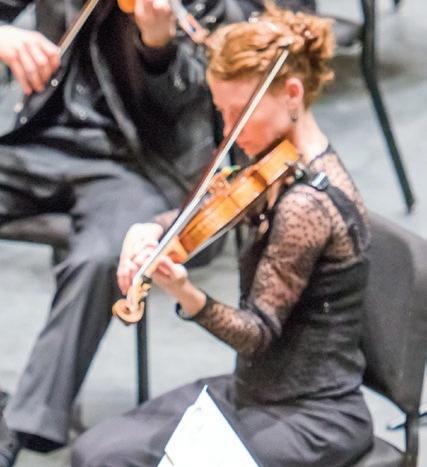
Aaron Copland
Four Dance Episodes from Rodeo
I. Buckaroo Holiday
II. Corral Nocturne
III. Saturday Night Waltz
IV. Hoe-Down
Nick DiBerardino
Double Percussion Concerto
Featuring percussionists Sijia Huang & Garrett Arney of arx duo
INTERMISSION
Antonín Dvořák
Symphony No. 9 From the New World
I. Adagio – Allegro molto
II. Largo
III. Molto vivace
IV. Allegro con fuoco
Garrett ArneyAaron Copland was born in Brooklyn, New York, on November 14, 1900.
An American composer, critic, writer, teacher, pianist, Copland was referred to by his peers and critics as the "Dean of American Composers". He completed over a hundred significant works including song cycles, choral works, chamber music, works for solo piano, and large orchestral works: notably six Ballets, two Operas, three Symphonies, multiple concerti, film scores, Fanfares, Sketches and Variations.
Copland first learned to play the piano from his older sister then at the age of sixteen he went to Manhattan to study. It was during his early years he immersed himself in contemporary classical music. While studying in Europe, Russian/American conductor Serge Koussevitsky commissioned Copland to write a piece for the Boston Symphony. The resulting Symphony for Organ and Orchestra was Copland’s entry into the life of professional American music. Copland felt strongly that by incorporating popular forms of American music such as jazz and folk into his compositions, his pieces would be both exceptional and innovative.
Copland began to compose for the movies and ballet from a desire to reach a wider audience. Among his popular film scores were Of Mice and
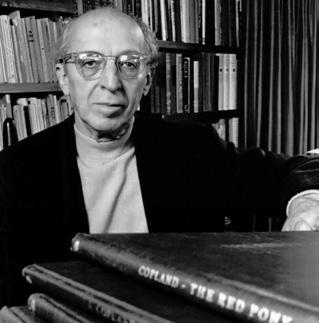
Men, Our Town and The Heiress , which won him an Academy Award. His most notable ballets, included Agnes DeMille’s Rodeo and Martha Graham‘s Appalachian Spring, for which he won the Pulitzer Prize. Through his remaining decades, Copland continued to compose and conduct, and write about his and other contemporary American composers works. He even traveled the world to elevate the status of American music abroad.
Aaron Copland died on December 2, 1990 in North Tarrytown, New York and is considered one of the most important figures in twentiethcentury American music.
Aaron Copland's ballet Rodeo is a celebration of the American West and reflects an important image we as Americans have of ourselves. The commission was from the Ballet Russe de Monte Carlo, with music by Copland and choreography by Agnes de Mille. The ballet was precedent setting – there were said to be 22 curtain calls at its premiere at the
Metropolitan Opera House on October 16, 1942 – and the success of this ballet insured that dance would thrive as an integral part of American musical theater.
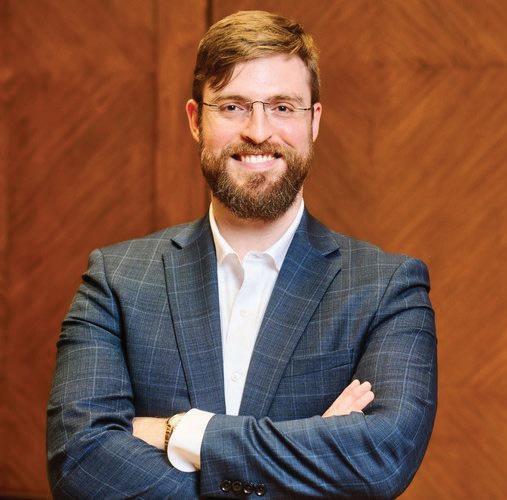
1989 - Present
Composer Nick DiBerardino is noted for creating “richly textured, multilayered” sound worlds (Minnesota Star Tribune) that tell fantastical tales. He has written music about everything from failed flying machines and particle physics to shadow puppets and tall glasses of beet juice. No matter the inspiration, DiBerardino's music and all his energies as a composer educator and administrator flow from the belief that music can invite people into inclusive communities.
A Rhodes Scholar, DiBerardino has received commissions from many distinguished artists and institutions,
including the Dover Quartet, Symphony Tacoma, Philadelphia Chamber Music Society, Sandbox Percussion, the Queen Elisabeth Music Chapel and Star Trek’s John de Lancie. DiBerardino's works have been performed around the world by the American Composers Orchestra, the Minnesota Orchestra, Aizuri Quartet, Contemporaneous, So Percussion and many others.
DiBerardino is dean of the Curtis Institute of Music, where he continues to serve on the faculty as chair of composition. He holds composition degrees from the University of Oxford, the Yale School of Music, the Curtis Institute of Music and Princeton University.
Double Percussion Concerto
“When someone sees a concerto for percussion, they expect to hear something loud, with virtuosic and exposed percussion parts, but the Double Percussion Concerto is actually very delicate, detailed, and in harmony with the ensemble . . . It’s not just a cool percussion piece, it’s a cool piece with a feature of percussion.”
- arx duo
1841 - 1904
Antonin Dvořák was born on September 8, 1841, in Nelahozeves, Bohemia, Austrian Empire. He was the first Bohemian/Czech composer to achieve worldwide recognition. He is

noted for turning folk material into the language of 19th-century Romantic music. In particular he employed the idioms of the folk music of Moravia and his native Bohemia.
In 1877, on recommendation by Brahms, the publisher Simrock commissioned Dvořák to write some Slavonic Dances for piano duet, aimed at the lucrative domestic market. Dvořák fast became an international celebrity, in some places almost overnight. In Berlin the sheet music sold out in one day.
Dvořák sailed to New York in autumn 1892, and his time in America produced three of his most famous works, the String Quartet No.12, 'American' , the Cello Concerto in B minor and the New World Symphony.
Dvořák's most well-known work is his Symphony No.9, “From the New World, ” in which he featured and integrated Native American inspired tunes and African American spirituals into this most European of art forms. The last years of his life, Dvořák composed some short orchestral works and wrote his operatic masterpiece, Rusalka
When he died of a heart attack after a short illness in Prague on May 1, 1904, he was mourned as a national hero, and his music has remained popular ever since.
Symphony No. 9, From the New World
Dvořák began his symphony in late 1892 and finished it the following May. The first performance, in New York on December 16, 1893, was a major event, with a public rehearsal and much advance press attention. Its reception was a major triumph.
Dvořák wrote to a friend in Bohemia that the Symphony “will be fundamentally different from my earlier ones. Anyone with a ‘nose’ for these things will detect the influence of America.”
Sijia Huang , a native of Shenzhen, China, is a percussionist who has made significant strides in her musical career. She recently attained her Master of Musical Arts degree from the Yale School of Music under the esteemed guidance of Robert van Sice.
Huang’s talent has led her to hold a principal percussionist position at New Jersey’s Symphony in C as well as working as a substitute percussionist with the Shenzhen Symphony Orchestra. Passionate about expanding her musical horizons, Sijia has actively participated in various festivals,
including the Aspen Music Festival and School, Brevard Music Center, Juilliard Summer Percussion Seminar and Festival Napa Valley.
In 2019, she had the honor of performing as a soloist with the Curtis Symphony Orchestra alongside the Percussion Collective Robert van Sice. In 2023, she embarked on a captivating tour of Spain as a soloist with the Yale Concert Band. Sijia Huang's talents extend beyond performance. She had the privilege of being a speaker at the 2021 TEDx-Shenzhen SeniorHS event, where she shared her insights and expertise. Huang completed her Bachelor of Music degree at the Curtis Institute of Music under the tutelage of Don Liuzzi, Robert van Sice and Eric Millstein. During her time at Curtis, she was honored with the 2017 Avedis Zildjian Company Honorary Award. Furthermore, she accomplished her Master of Music degree in 2022. Starting in the fall of 2023, she will pursue her Doctor of Musical Arts degree at the University of Miami's Frost School of Music, studying with Svet Stoyanov and Joe Petrasek.
Percussion
Garrett Arney's richness of sound identifies his sincereness and intellectual curiosity in his performance. His passion for developing the genre of percussion music has inspired many composers
and musicians through creative collaboration and workshops. Arney, as a Co-Founder of the group “arx duo”, has worked with composers including Steven Mackey, Jonathan Bailey Holland, Juri Seo and many more to bring new works to life.
As a past member of Ensemble Connect, Arney performed the Carnegie Hall premiere of Steven Mackey’s “Micro-Concerto”, as well as many other performances throughout New York City. He also served as a teaching artist for schools and community centers throughout the Five Boroughs. In addition, Arney has held guest faculty positions at Peabody Conservatory, Curtis Institute of Music, Michigan State University and Cleveland State University, among others.
Primarily a chamber musician, Arney travels around the country and on multiple continents performing with his duo. They have premiered several works together for percussion duo, as well as many collaborative works other chamber groups and large ensembles. This upcoming season will see the duo premiere their first three concerti with orchestra, as well as reprise their first ever concerto with wind ensemble, in addition to larger collaborative projects.
A native of Michigan, Arney studied at Michigan State University, Peabody Conservatory and the Yale School of Music under the tutelage of Robert van Sice, and is now working full time in Seattle as Co-Artistic Director of his 501(c)3 non profit, Arx Music Association, with a primary mission of creating and presenting new works through his duo.
Artosphere Chamber Music Concert
May 15 | 7pm
Crystal Bridges Museum of American Art Bentonville
PROGRAM
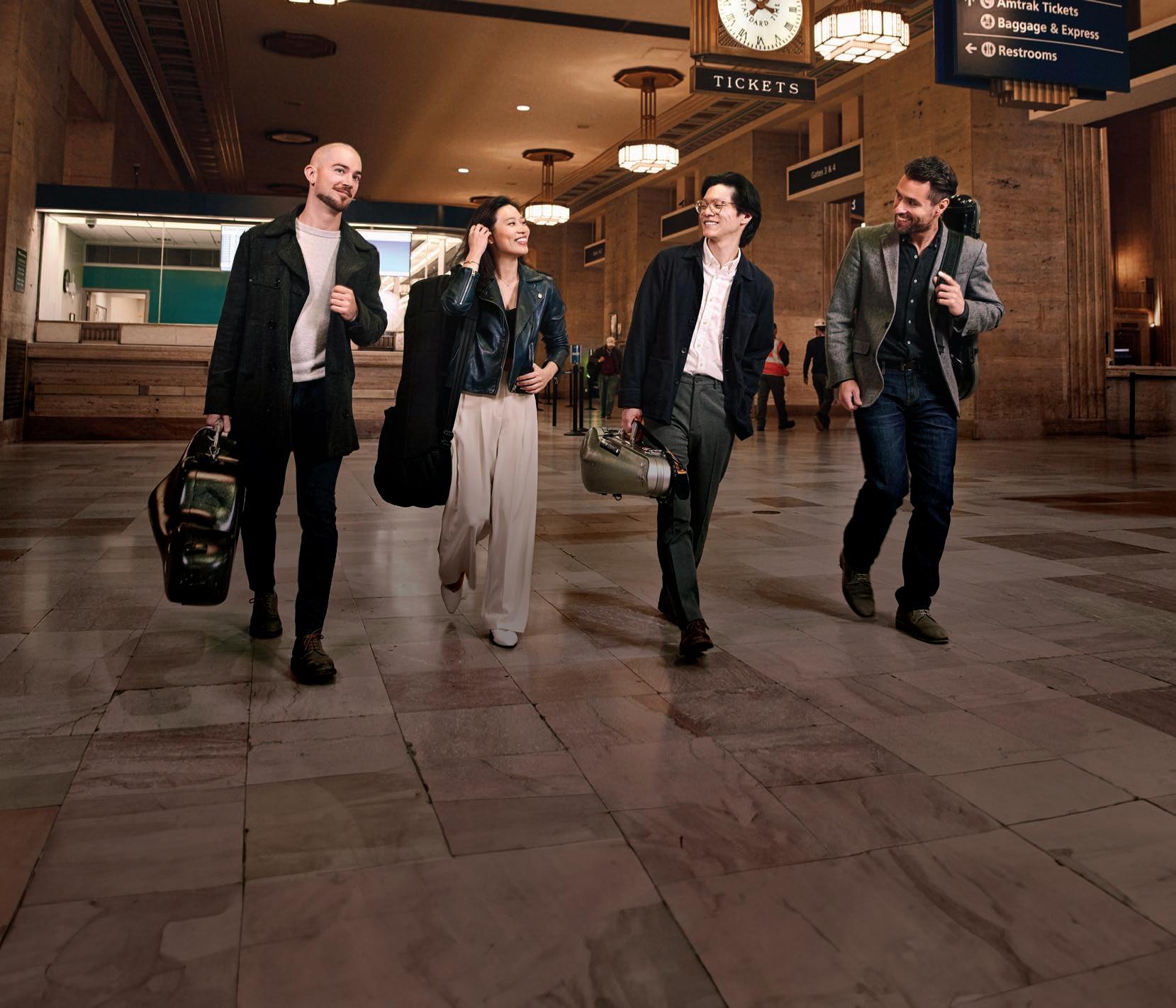
Joaquín Turina
La oración del torero, Op. 34
Florence Price
String Quartet No. 1 in G major
INTERMISSION
Franz Schubert
String Quartet No. 14 in D minor, D. 810 “Death and the Maiden”
For more information about Dover Quartet, see page 6.
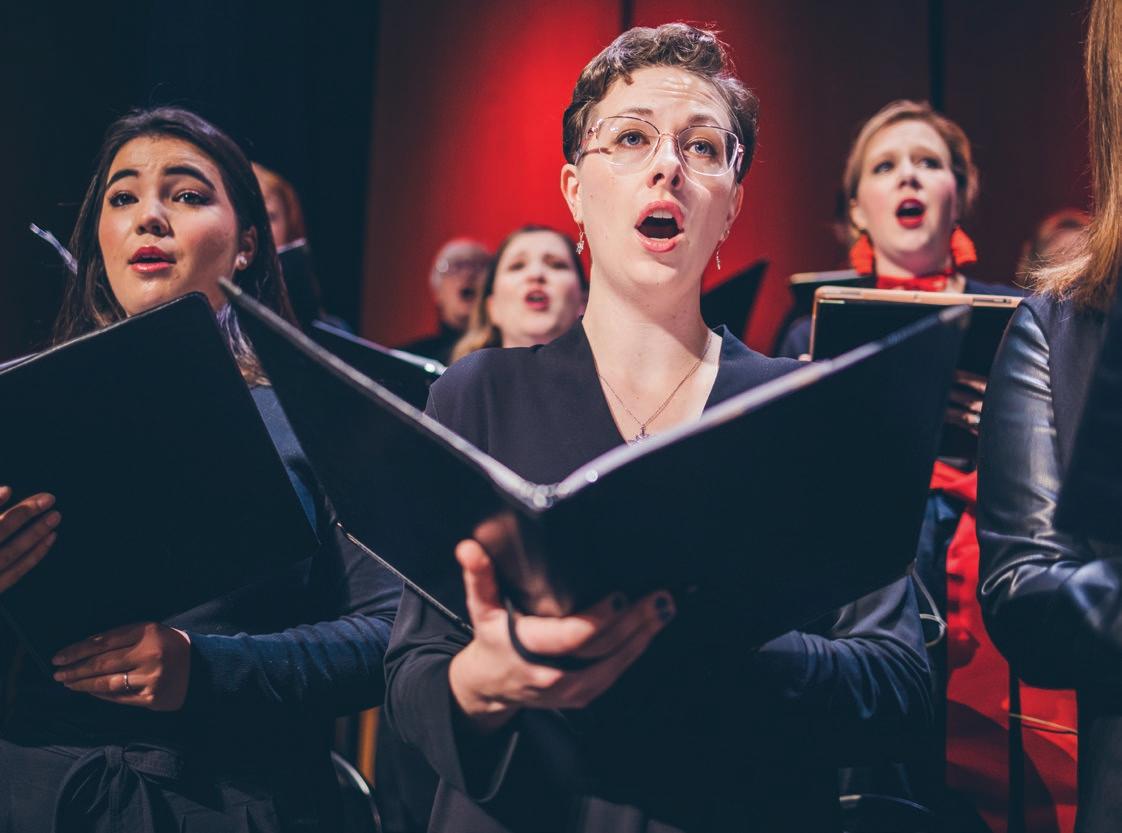

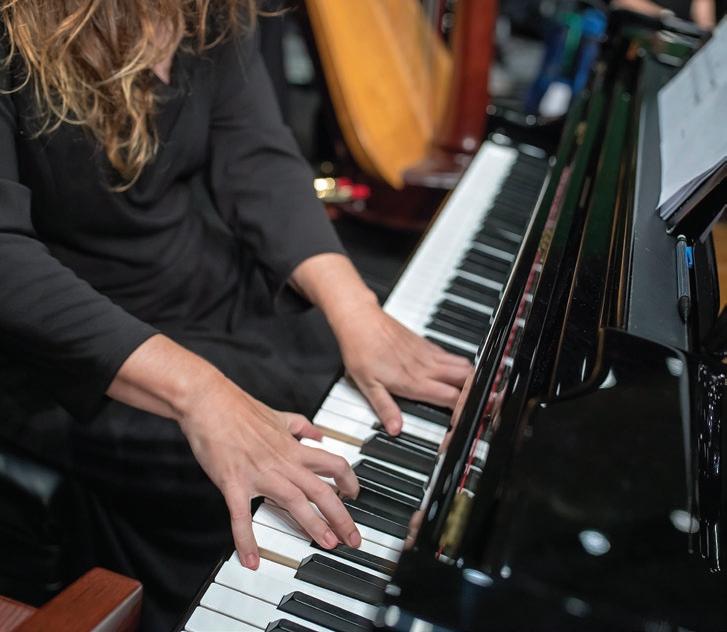
Corrado Rovaris, Music Director
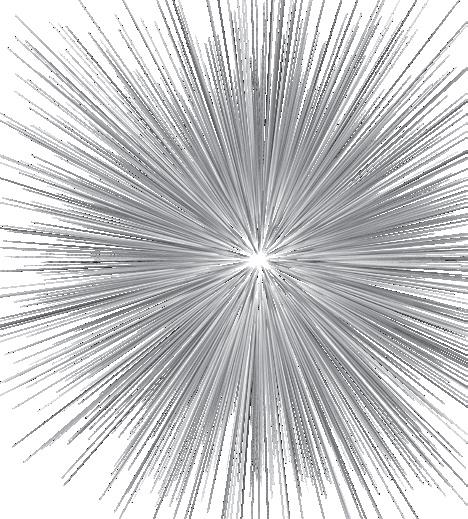
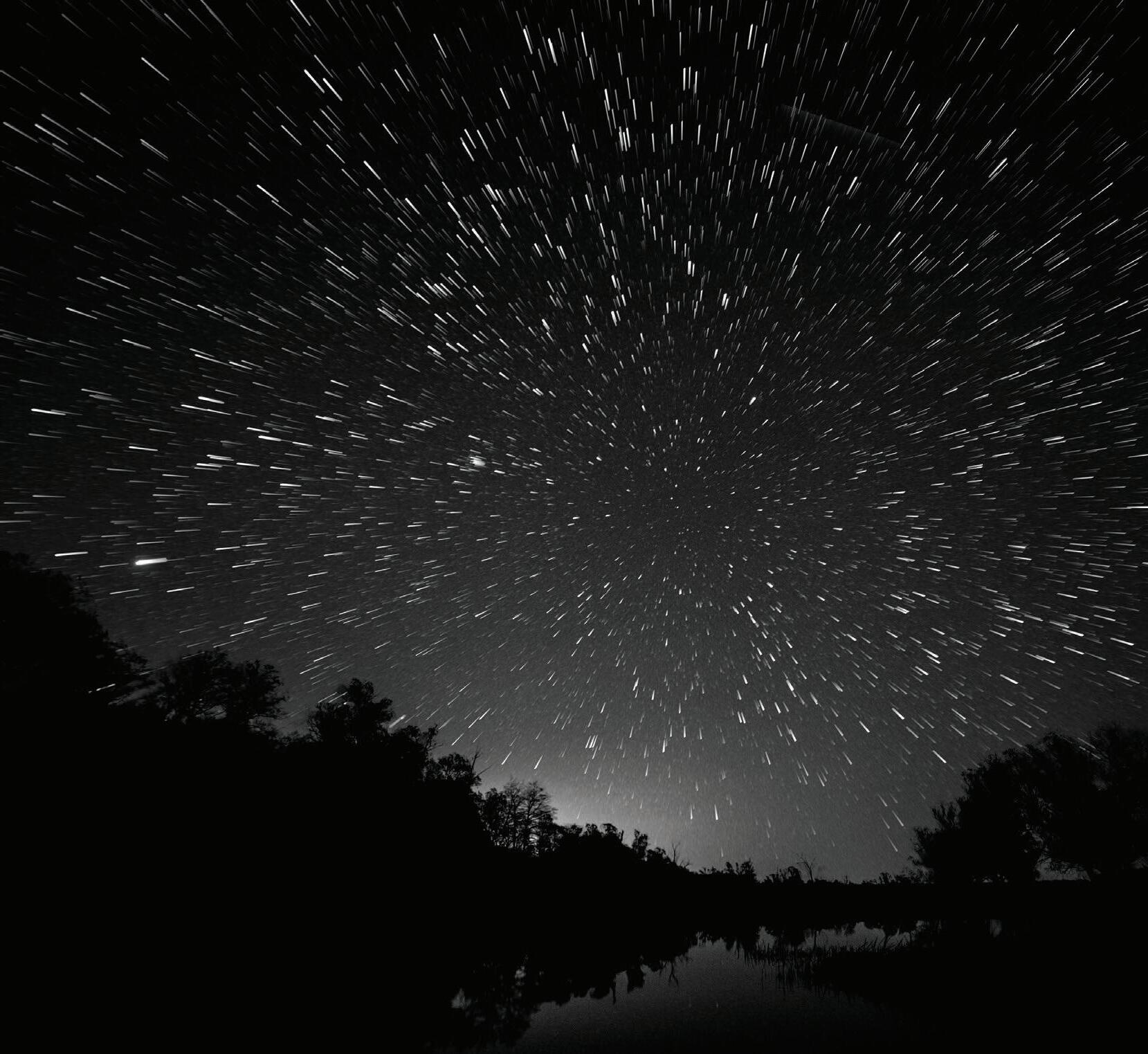
Tiffany Townsend, Soprano
Allyson McHardy, Mezzo-Soprano
Matthew Plenk, Tenor
Adam Lau, Bass

In partnership with Tulsa Opera Chorus, SoNA Singers and University of Arkansas
Schola Cantorum
Lyndon Meyer, Artosphere Chorus Director
May 18 | 8pm
Walton Arts Center’s Baum Walker Hall
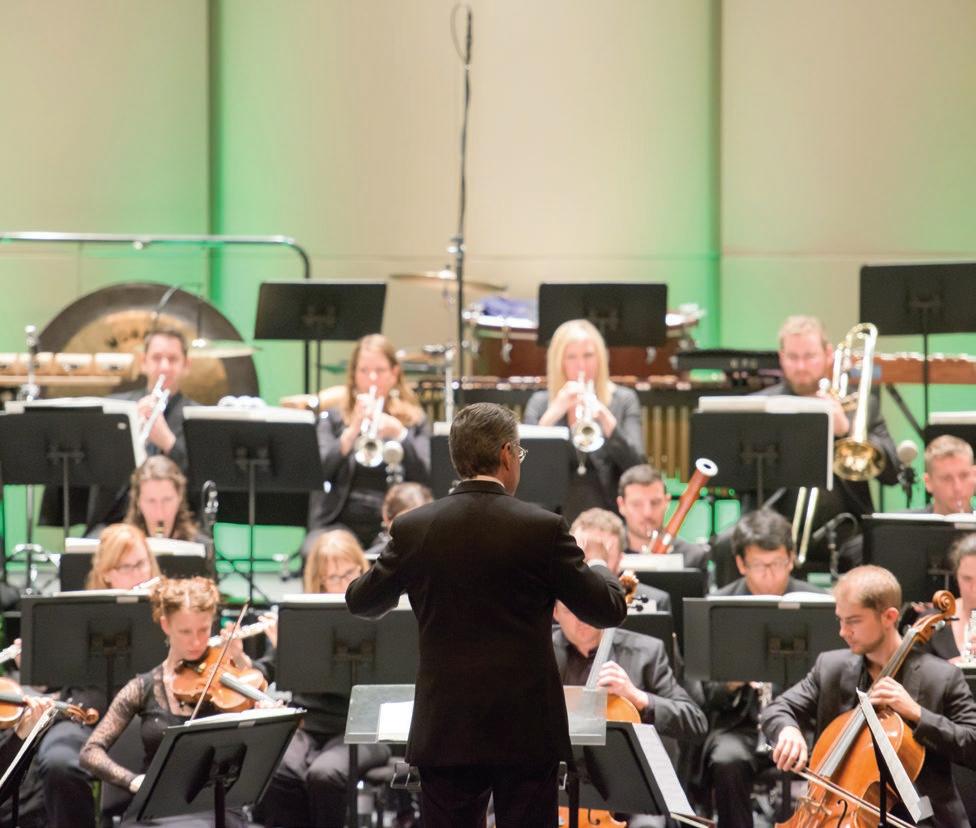
Giuseppe Verdi
Messa da Requiem
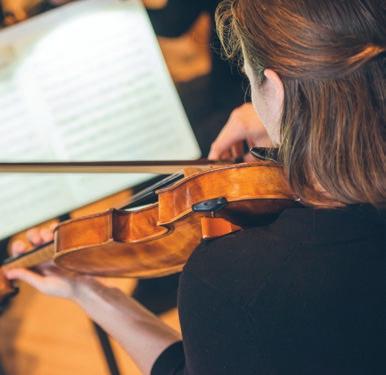

I. Requiem and Kyrie (Solo Quartet, Chorus)
II. Dies irae
Dies irae (Chorus)
Tuba mirum (Chorus)
Mors stupebit (Bass)
Liber scriptus (Mezzo-Soprano, Chorus)

Quid sum miser (Soprano, Mezzo-Soprano, Tenor)
Rex tremendae (Solo Quartet, Chorus)
Recordare (Soprano, Mezzo-Soprano)
Ingemisco (Tenor)
Confutatis (Bass, Chorus)
Lacrimosa (Solo Quartet, Chorus)
III. Offertorium (Solo Quartet)
IV. Sanctus (Double Chorus)
V. Agnus Dei (Soprano, Mezzo-Soprano, Chorus)
VI. Lux aeterna (Mezzo-Soprano, Tenor, Bass)
VII. Libera me (Soprano, Chorus)
Performed without intermission

1813 – 1901
Giuseppe Verdi's works are performed more often today than those of any other opera composer. Born in the village of Le Roncole, near Parma, on October 10, 1813, he began studying music as a boy in Busseto, a nearby town. He tried to enter the Milan Conservatory in 1832 but was refused admission because he was too old and lacked sufficient formal training. He began taking private music lessons in Milan in 1839. Verdi's first opera, Oberto Conte di San Bonifacio, was a success at its premiere at La Scala in Milan.
Between 1838 and 1840 Verdi's first wife and their two small children died. The grief-stricken composer then finished a comic opera, Un Giorno di Regno, which was a failure when presented in 1840. However, with the success of his third opera, Nabucco (1842), Verdi became the foremost Italian composer of his time. There followed an intense tenyear creative period (1842-1852) in which he wrote fifteen operas. Between 1851 and 1871 Verdi produced a remarkable series of masterpieces, including Rigoletto (1851), Il Trovatore (1853), La Traviata (1853), I Vespri Siciliani (1855), Simon Boccanegra (1857, revised 1881), Un Ballo in Maschera (1859), La Forza Del Destino (1862), Don Carlos (1867) and Aida (1871). Verdi wrote a
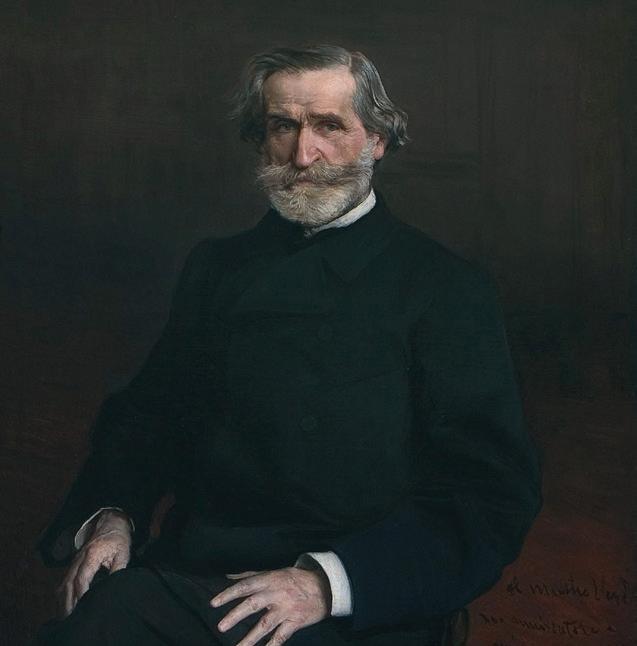
total of 26 operas. He composed all his operas using Italian librettos (texts) except for the The Sicilian Vespers and Don Carlos which he originally wrote to French librettos. Verdi gained fame for his mastery of theatrical effect and the stirring melodic quality of his operas. He took several of his plots from the plays of great dramatists such as Victor Hugo, Friedrich Schiller and William Shakespeare. Many of the melodies he wrote are well-known all over the world.
After completing Aida in 1871, illness and old age seemed to have ended his career. During the next sixteen years his only important composition was the acclaimed Messa da Requiem (1874) in memory of the Italian author Alessandro Manzoni. In the mid-1880's through the urging of his friend Arrigo Boito, a noted Italian poet and composer, Verdi returned to composing operas. Boito contributed librettos for Verdi's Otello (1887) and Falstaff (1893). Many critics have called Otello Verdi's greatest tragic
opera. Falstaff, Verdi's second comic opera, ranks as one of the greatest comic operas ever written. Verdi's only works after Falstaff were four beautiful religious compositions for voices called Quattro Pezzi Sacri (1898).
A period of national mourning was declared in Italy following his death on January 27, 1901.
Verdi’s Requiem
Verdi was an agnostic his entire adult life. He neither mocked religion nor even strongly disapproved of it, saying “to have faith is good, but not to rely on faith is better.” But Verdi was moved to his very core by the death of the great Italian author Alessandro Manzoni (1785-1873).
Verdi had revered Manzoni and considered him national hero. As a tribute to Manzoni, Verdi wrote his Messa da Requiem. It is, as many have observed, the greatest opera that Verdi never wrote.
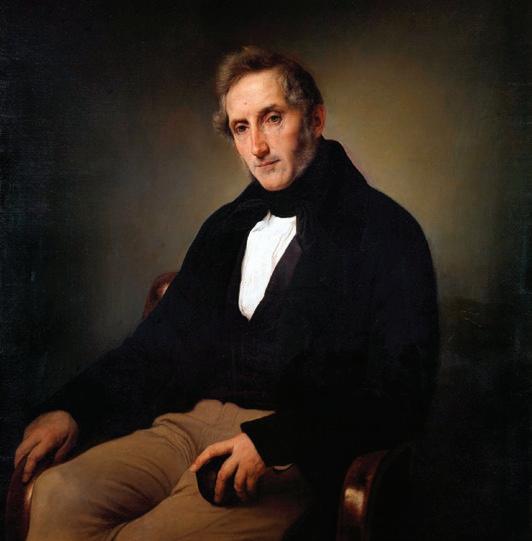
Verdi’s Requiem premiered in Milan exactly one year after Manzoni’s death, at St. Mark’s church and later at La Scala. It was an enormous success, and Verdi was soon invited to conduct the work all over Europe. To Verdi, the Requiem was a grand public tribute to a great man, based on a moderately more profound libretto than usual. Despite its purpose, Verdi brought to life the two great and powerful themes of any requiem; fear and hope, for believers and non-believers alike.
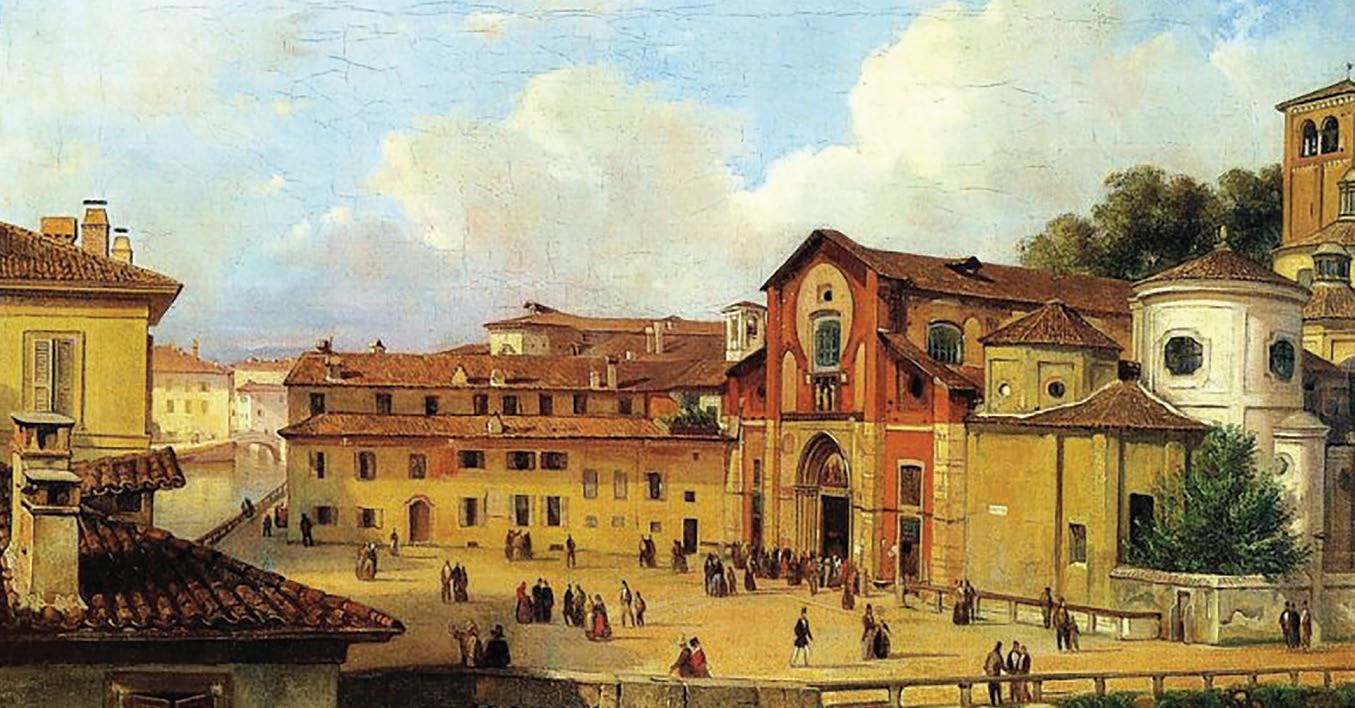
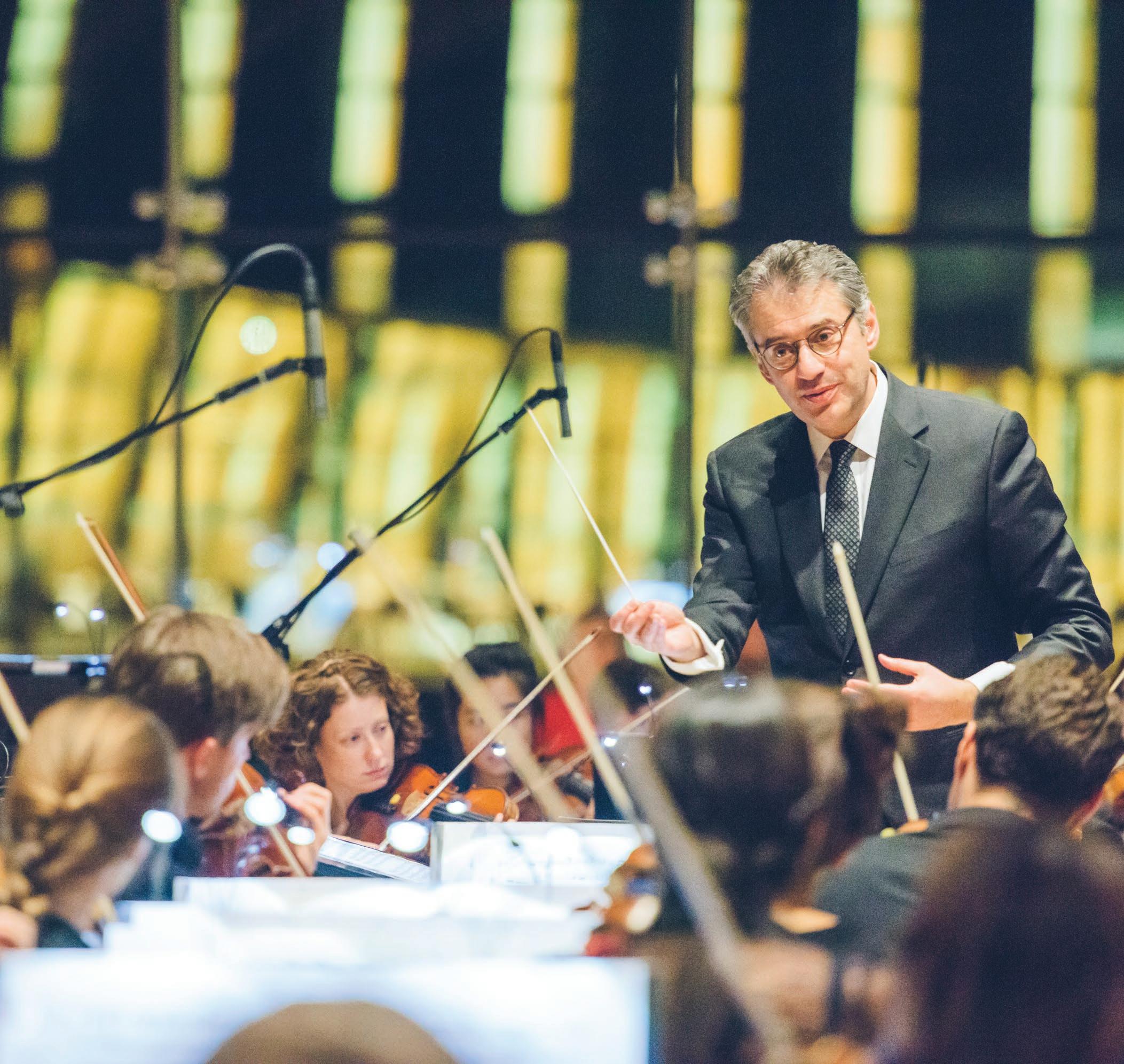
May 22 | 7pm
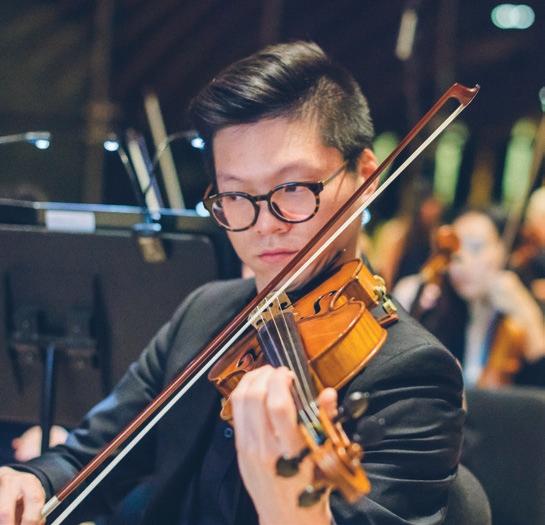


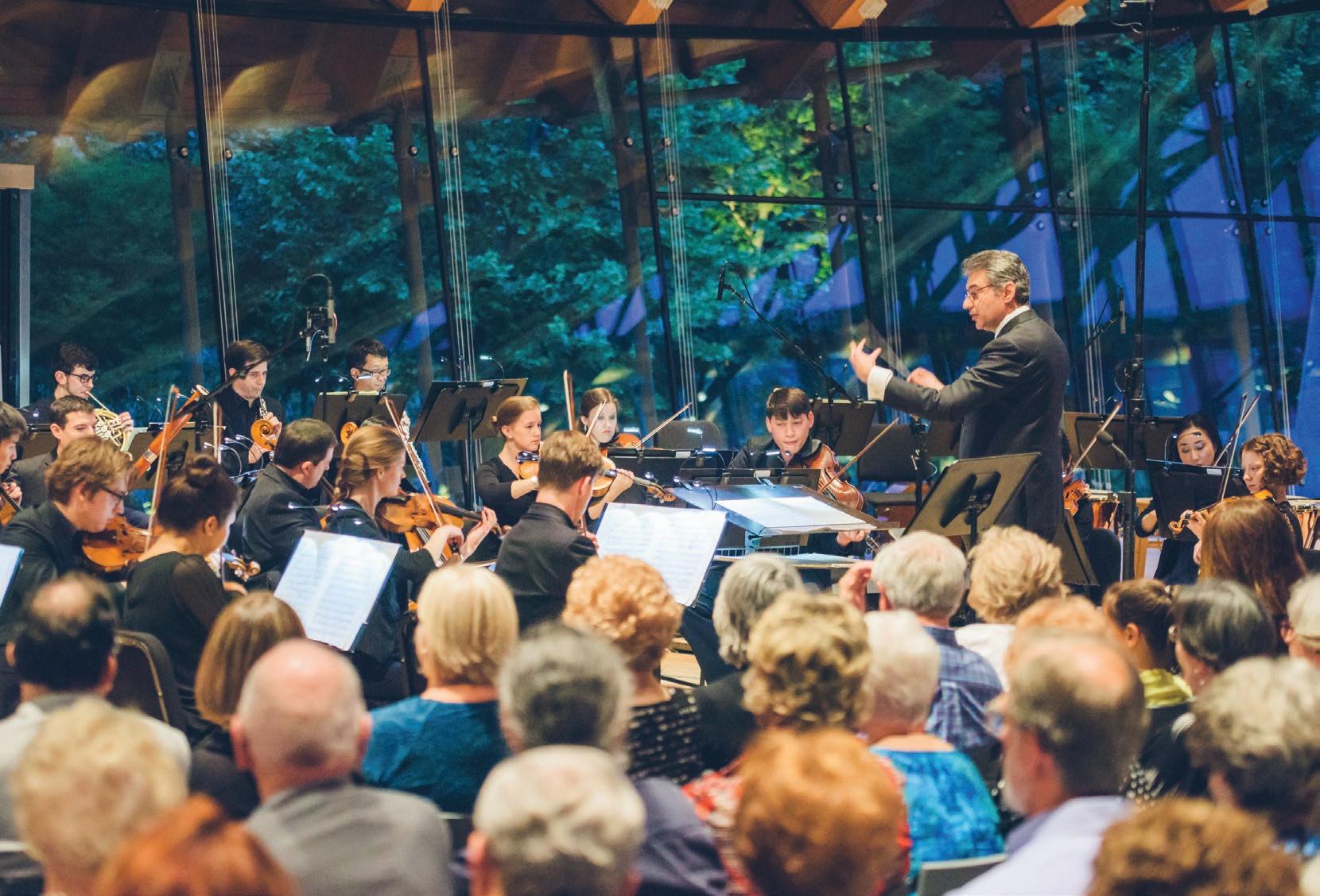
Serenade No. 6 for Orchestra in D major, K. 239
I. Marcia (maestoso)
II. Minuetto
III. Rondo (allegretto)
Piano Concerto No. 20 in D minor, K.466
Featuring Jaeden Izik-Dzurko, Piano
I. Allegro
II. Romanze
III. Rondo, Allegro assai
INTERMISSION
Symphony No. 41 in C major, K. 551 “Jupiter”
I. Allegro vivace
II. Andante cantabile
III. Menuetto: Allegretto – Trio
IV. Molto allegro
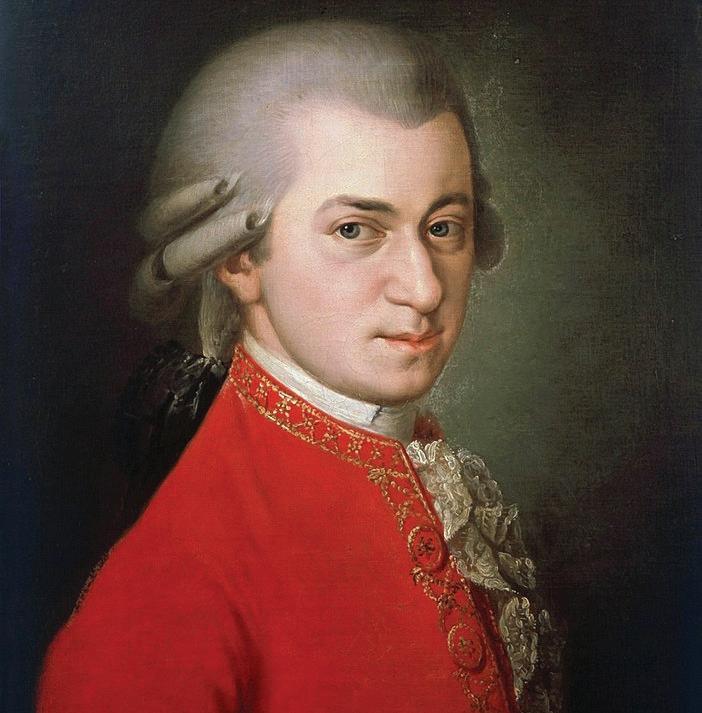
1756–1791
Mozart was born on January 27, 1756, in Salzburg, then capital of the independent Archbishopric of Salzburg, part of the Holy Roman
Empire, now a city in Austria. Mozart began playing the keyboard by age 3, composed minuets by age 5 and started playing in public by age 6. He was a famous child prodigy playing piano, harpsichord, organ, violin and viola as part of many tours across Europe arranged and led by his father, composer and musician, Leopold Mozart. A prolific composer, Mozart completed more than 600 works that profoundly shaped classical music, including 21 stage and opera works, 15 masses, more than 50 symphonies, 25 piano concertos, 12 violin concertos, 27 concert arias, 17 piano sonatas, 26 string quartets and many other pieces. Mozart died in Vienna in 1791 at the young age of 35.
Serenade No. 6 in D major, K.239
Mozart’s Serenade No. 6 in D major, K.239 was completed in January, 1776. Still living in Salzburg, he was just turning 20. In his serenade he
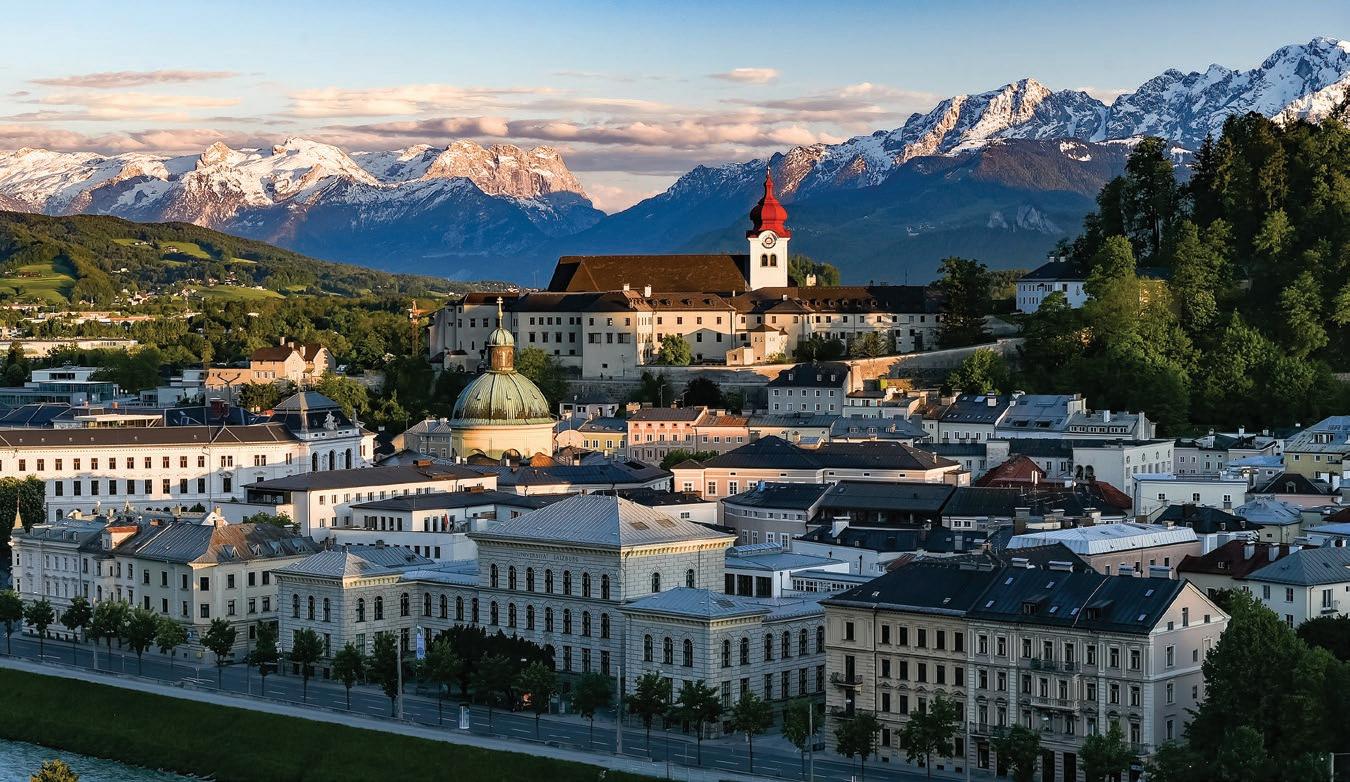

sets a solo quartet of strings against a supporting ensemble of strings and timpani. Mozart’s separation of the smaller string group speaks to the Baroque concerto grosso form of composition which could feature as many as four soloists from within a larger ensemble. His music in this piece has a conversational character, and all three movements derive from dances.
Piano Concerto No. 20 in D minor, K. 466
Wolfgang Amadeus Mozart composed his Piano Concerto No. 20 in 1785. Which was performed first at the Mehlgrube Casino in Vienna on February 11, 1785, with Mozart personally playing the piano solo.
Symphony No. 41 in C major, K. 551, Jupiter
Wolfgang Amadeus Mozart completed his Symphony No. 41 in C major, K. 551 on August 10, 1788. One of a set of three symphonies that Mozart composed in rapid succession during the summer of 1788, No. 39 was completed on June 26, and No.
40 on July 25. The longest and last symphony that he composed, No. 41 is regarded by many critics as among the greatest symphonies in classical music. The work is nicknamed the Jupiter Symphony, which is credited to the impresario Johann Peter Salomon. It is not known with certainty whether Symphony No. 41 was ever performed during Mozart’s lifetime.
Piano Celebrated by the Canadian Broadcasting Corporation in 2021 as one of “30 hot Canadian classical musicians under 30,” pianist Jaeden Izik-Dzurko is earning a reputation as a promising young artist. Recognized by audiences, conductors, composers and critics alike for the exceptional communicative power and thoughtfulness of his interpretations, “…he projects a distinctive musical personality that imbues even the most routine passagework with character and individuality” (Calgary Herald ).
Izik-Dzurko has performed alongside the Bilbao Orkestra Sinfonikoa, the Calgary Philharmonic Orchestra, the Hilton Head Symphony Orchestra, the Okanagan Symphony Orchestra, the Kamloops Symphony, the Jove Orquestra Nacional de Catalunya, the
Lions Gate Sinfonia, the Orquesta Sinfónica de Madrid, the Orquesta Sinfónica de RTVE and the Real Orquesta Sinfónica de Sevilla. His playing has been broadcast on CBC Radio’s In Concert, WQXR’s Young Artists Showcase and APM’s Performance Today
An experienced recitalist, Izik-Dzurko has appeared in such venues as Wigmore Hall in London, Salle Cortot in Paris, and the Auditorio Nacional de Música in Madrid. His October 2022 debut at Weill Recital Hall at Carnegie Hall drew a rave review from New York Concert Review: “… one of the most refined tonal palettes I have ever heard, combined with a polished close-to-the-keys technique, and a certain basic humility in the service of the music.”
Izik-Dzurko is a First Prize winner at the 2022 Hilton Head International Piano Competition and the 2022 Maria Canals International Music Competition. Most recently, he was
awarded the First Prize, the Canon Audience Prize, and the Chamber Music Award at the 20th Paloma O'Shea Santander International Piano Competition. He is also a Grand Prize winner at the Federation of Canadian Music Festivals’ National Competition a winner of Juilliard’s Gina Bachauer Scholarship Competition and a Second Prize and J.S. Bach Prize winner at the OSM Competition. IzikDzurko is the recipient of a 2024 Borletti-Buitoni Trust Fellowship.
Born in Salmon Arm, British Columbia, Izik-Dzurko earned his Bachelor of Music degree at The Juilliard School under Yoheved Kaplinsky and his Master of Music degree at the University of British Columbia with Corey Hamm. He is also a former student of Ian Parker. He currently studies with Jacob Leuschner at the Hochschule für Musik Detmold and Benedetto Lupo at the Accademia Nazionale di Santa Cecilia.
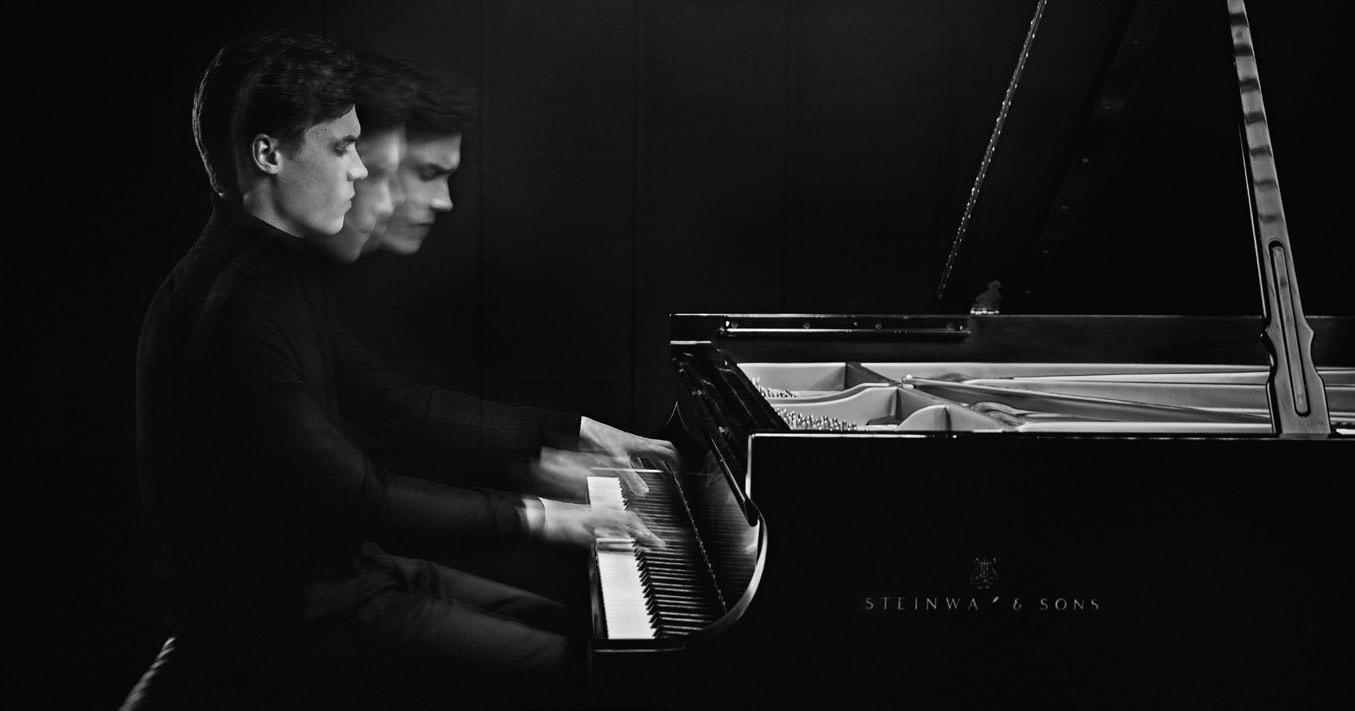 MOZART
MOZART
EVENTS AT-A-GLANCE
Dover Quartet
MAY 11 | 7pm | St. Paul’s Episcopal Church, Fayetteville | Tickets: $15
Hailed by The New Yorker as “one of the world’s finest young string quartets,” the Dover Quartet once again returns to bring their unmistakable sound to Northwest Arkansas.
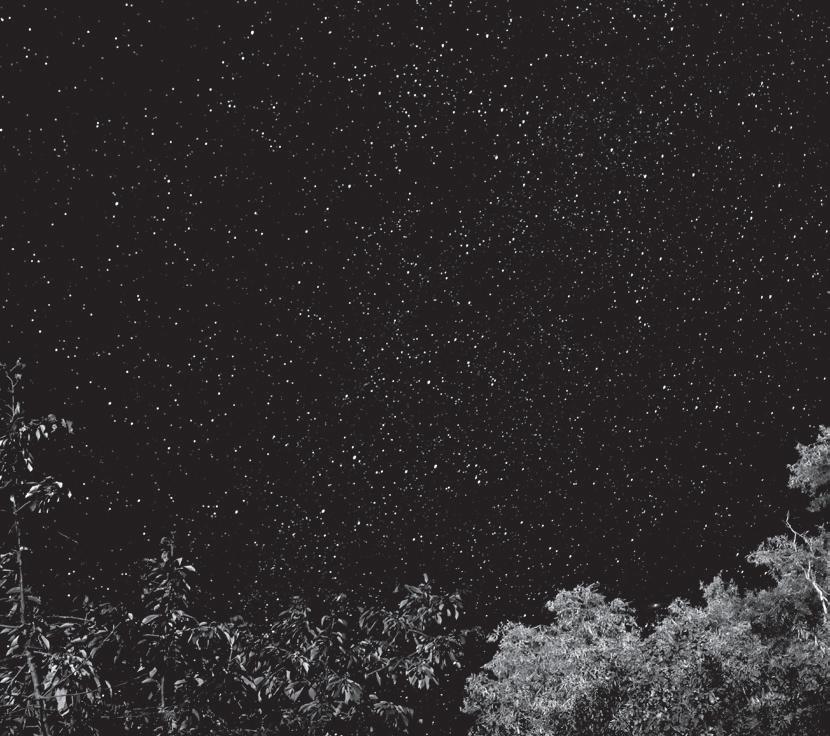
American Soundscapes
MAY 14 | 7pm | Walton Arts Center | Tickets: $10
Performing Aaron Copland’s Four Dance Episodes from Rodeo, Nick DiBerardino’s Percussion Concerto featuring percussionists from arx duo and Antonín Dvořák’s Symphony No. 9 From the New World.
Dover Quartet
MAY 15 | 7pm | Crystal Bridges Museum of American Art | Tickets: $29
Verdi’s Requiem
MAY 18 | 8pm | Walton Arts Center | Tickets: $15-50
Performing Giuseppe Verdi’s Messa da Requiem, the orchestra will be joined by regional choruses and feature soprano Tiffany Townsend, mezzo-soprano Allyson McHardy, tenor Matthew Plenk and bass Adam Lau.
MAY 22 | 7pm | Crystal Bridges Museum of American Art | Tickets: $54
Performing Mozart’s Serenade No. 6 for Orchestra in D major, Piano Concerto No. 20 in D minor featuring Jaeden Izik-Dzurko and Symphony No. 41 in C major (Jupiter).
For tickets and information, visit artospherefestival.org